Dive Training
So you’re thinking about trying scuba diving, but you’re not sure where to start. It is actually not difficult to get your entry-level certification to dive, easier than getting a driver’s license. Look in the Yellow Pages or in the Directories section of this website for a shop near you, or inquire at the local college, university, or YMCA, which may run classes that are open to the public.
- Gear Contents ...
- Dive Training ...
- Dive Gear ...
- Diving Activities ...
- Gas Calculators
- DPlan ...

Human lungs are designed to extract the oxygen we need from air - a mixture of roughly 21% oxygen and 79% nitrogen, at a pressure of one atmosphere ( about 14.7 psia.) As you dive deeper and longer while breathing air, the increased pressure causes ever-greater amounts of both gases to dissolve in your blood and tissues. One would expect that eventually, such elevated concentrations would become troublesome, and indeed that is the case. As it turns out, nitrogen, with its greater concentration in the air, is the first gas to become a problem during a dive to recreational depths ( <130 ft. )
This problem is that of "off-gassing", or decreasing the concentration of dissolved nitrogen in the body at a rate that does not cause bubbles of the gas to form in the tissues and blood, the condition commonly known as the bends. One way to delay the onset of this problem is to decrease the concentration of nitrogen in the breathing gas, and the easiest way to do this is simply by increasing the concentration of oxygen. The resulting mixture is typically known as Enriched Air Nitrox and has become a staple in the diving community.
More: Nitrox and Air ...
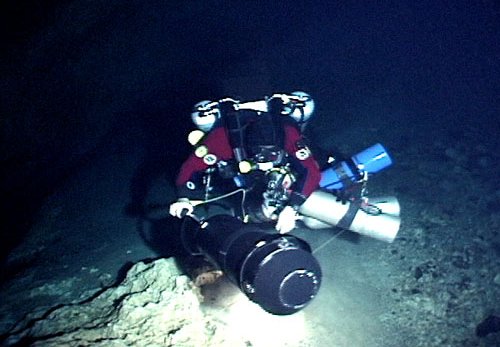
"DIR" or "Doing It Right" is a system of diving developed by cave divers which involves extremely rigid gear configurations and methodologies. To its adherents, DIR takes on an almost religious significance. For the true follower of DIR, no deviation may be tolerated, because DIR is perfection.

DIR is designed for cave diving. The usual object of cave diving is to go in and come back out alive. In line with this goal of accomplishing essentially nothing, DIR espouses an absolutely minimal equipment kit: "When in doubt, leave it home." DIR also espouses teamwork, mutual interdependence, and close lock-step buddy diving, things that are pretty much unavoidable in the confines of a cave anyway.
More: Doing It Right? ...
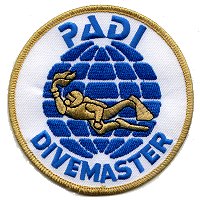
Moving on to the professional level, the lowest professional rating is Divemaster. I would hardly recommend doing this unless you are really interested in turning Pro - Divemaster is the longest and most arduous rating of all to get. The Divemaster course is like graduate school - a year or more of indentured servitude. On the other hand, pitching in with classes and other activities can be a lot of fun. Divemasters are the sergeants and mules of the diving world and carry out much of the tour-guiding, tank-filling, and grunt work at resorts and on dive boats. Beyond Divemaster, there is Assistant Instructor, which is basically gold-plated Divemaster, and then increasing levels of Instructor.
More: Dive Training - Advanced ...
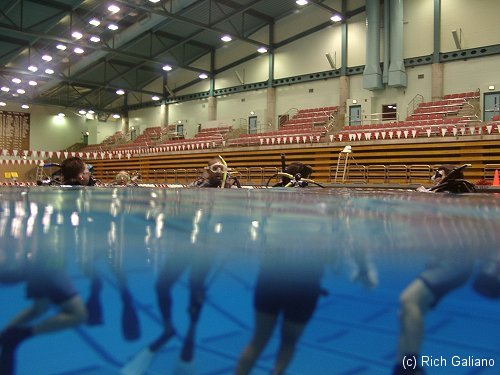
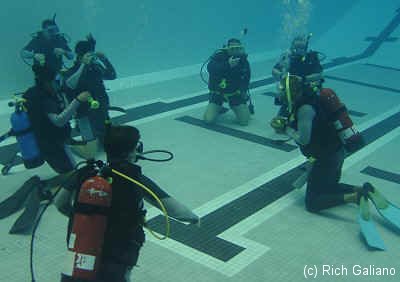
Scuba diving in the United States is by and large not regulated by the government ( as opposed to Australia and other places, where it is. ) This remarkable fact is the result of the scuba industry's so-far successful efforts to head off government meddling by putting forth their own standards for training, equipment, and other specifics. In fact, all the major diving certification organizations and manufacturers actually got together and agreed on a basic set of requirements for the industry, and even have an ISO-9000 certification for it.
More: Dive Training - Getting Started ...
Here are a series of excellent articles regarding the buddy system, reproduced from their original sources before they "wink out", as so much good web content does. With regard to the Buddy System that is so entrenched in dive training, these articles are all negative. I feel no need to present counter-balancing positive arguments since you can get that from any dive instructor with any of the major certifying organizations.
When you first get certified, you will have had the buddy system drilled into you. At this point, you still have basically no idea what you are doing, so just do it that way. A lot of what is in the basic open-water certification is silly and even unnecessary, but it won't get you killed.
As a newly-certified diver, you are a danger to yourself and everyone around you. Be glad that any operator will take you out, and don't rock the boat. If they want you to dive with a buddy, dive with a buddy. As crew, I've spent numerous dives paired up with newbies to make sure they have a good time and get back to the boat OK. Shallow-water shore diving can get very tricky, and things can go very wrong, and if you are not experienced, having a buddy can be a lifesaver.
More: The Buddy System ? ...
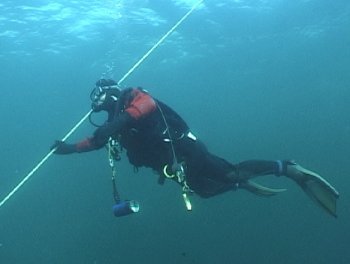
Here is a description of recreational dive planning. The purpose here is to demonstrate basic dive planning and use of Dive Tables for non-divers who are interested in becoming certified but are worried about the complexities and math involved. Learning to use dive tables is usually the single most daunting classroom task for a student diver. It's really not all that hard.
The purpose of dive planning is to manage the Nitrogen gas that is absorbed into the tissues of your body while breathing air at higher-than-normal pressures underwater. If you absorb too much Nitrogen at depth and then ascend to normal atmospheric pressure, the gas will form bubbles in your blood and tissues. This is called Decompression Sickness, commonly known as "the bends." Decompression Sickness can vary in severity from barely noticeable to fatal, depending on your dive profile and other factors. The goal of no-decompression dive planning is to plan your dives in advance so that under no circumstances* can ascending to the surface result in Decompression Sickness.
More: Dive Planning ...
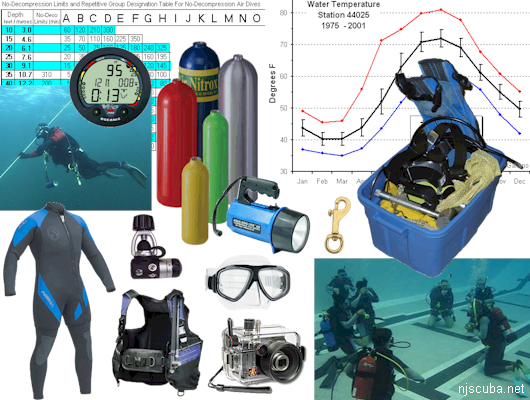
- Home ...
- Dive Sites ...
- Artificial Reefs ...
- Marine Biology ...
More important than gear is training, and more important than training is experience. You can buy gear and training, but there is only one way to get experience.
In aviation there is a saying: "You start out with a full bag of luck, and an empty bag of experience. The trick is to fill up the bag of experience before the bag of luck runs out." The same is true for diving. Take it slow. As one of my instructors said: "There are old divers, and there are bold divers, but there are no old bold divers."
When you start out in this sport, buying your first set of dive gear can be bewildering, not to mention expensive. The sad truth is that as a newly-certified diver, the equipment you have seen and used so far is not what you should be buying for real-world use. Almost all of it - jacket-style BC, weight belt, light, snorkel, etc - is more suited to floating students in a swimming pool or quarry than real-world diving. Most scuba gear is designed for the mass market of easy, infrequent, warm water diving, and is inadequate and/or inappropriate for diving around here. With so many different models and variations of everything - how do you select the best equipment for you? In the absence of any other guide, your first impulse may be to go out and buy just the same gear you were trained in - which is almost certainly an expensive mistake.
More: Scuba Gear & Training ...
